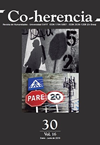Monopoly capitalism during Nazi Germany and the violation of human rights
Main Article Content
Keywords
Capitalism, nazism, human rights, authoritarianism, Frankfurt School, Franz Neumann
Abstract
This paper argues that the authoritarian and totalitarian exacerbation of capitalism, in the first half of the 20th century, originated in the crisis experienced by free market capitalism, due to the dynamics of the liberal society. The result was a massive violation of liberal human rights that had enabled the consolidation and legitimation of free market capitalism itself. Thus, the text suggests that an authoritarian tendency, linked to the unstable dynamics and the tendency to crisis of capital reproduction, is inherent to modern liberal society. This structural feature is illustrated through the debates at the Frankfurt School on the end of liberal capitalism. Within this general horizon, the paper gives special consideration to the critical analysis carried out by Franz Neumann, in tension with Friedrich Pollock's "state capitalism" thesis on the totalitarian transformation of the Weimar Republic.
Downloads
References
Adorno, Th. (2005). Dialéctica negativa. La jerga de la autenticidad. Madrid: Akal.
Adorno, Th., y Horkheimer, M. (1969). Dialéctica del Iluminismo. Buenos Aires: Suramericana.
Anderson, P. (1978). Consideraciones sobre el marxismo occidental. México: Siglo XXI.
Arrighi, G. (2014). El largo siglo XX. Madrid: Akal.
Benhabib, S. (1994). La crítica de la razón instrumental. En S. Zizek (Comp.), Ideología. Un mapa de la cuestión (pp. 77-113). Buenos Aires: Fondo de Cultura Económica.
Blanco, J. P. (2014). Capitalismo, fascismo y democracia en la obra de Karl Polanyi. Encrucijadas, (7), 133-152. Recuperado de http://www.encrucijadas.org/index.php/ojs/article/view/28
Blanco, J. P. (2015). República y economía. Un análisis de la relación siempre conflictiva, y acaso antagónica en el límite, que se da entre un sistema económico de libre mercado y la institucionalidad política democrática. Sociología Histórica, (5), 471-508.
Connerton, P. (1980). The Tragedy of the Enlightenment. An Essay on the Frankfurt School. Cambridge: Cambridge University Press.
Habermas, J. (2010). Teoría de la acción comunicativa. Madrid: Trotta.
Harvey, D. (2004). El nuevo imperialismo. Madrid: Akal.
Harvey, D. (2007). Espacios del capital. Hacia una geografía crítica. Madrid: Akal.
Harvey, D. (2010). The Enigma of Capital and the Crises of Capitalism. New York: Oxford University Press.
Heinrich, M. (2008). Crítica de la economía política. Una introducción a El Capital de Marx. Madrid: Escolar y Mayo Editores.
Hobsbawm, E. (2012). Historia del siglo XX. Barcelona: Crítica.
Honneth, A. (2009). Crítica del poder. Fases en la reflexión de una Teoría Crítica de la sociedad. Madrid: A. Machado Libros.
Horkheimer, M. (1972). El Estado autoritario. En Sociedad en transición: estudios de filosofía social (pp. 97- 123). Madrid: Planeta DeAgostini.
Horkheimer, M. (2003). Teoría Tradicional y Teoría Crítica. Buenos Aires: Amorrortu.
López, P. (2010). Behemoth o la Ilustración devastada. Reconsiderando a Franz Neumann. Daimon, (sup. 3), 207-2014. Recuperado de http://revistas.um.es/daimon/article/view/119321
Lukács, G. (1968). Geschichte und Klassenbewusstsein. Neuwied/Berlin: Luchterhand.
Mann, M. (2006). Fascistas. Valencia: Universitat de Valencia.
Marcuse, H. (1969). Cultura y sociedad. Buenos Aires: Editorial Sur.
Marcuse, H. (1983). Eros y civilización. Madrid: Sarpe.
Marx, K. (2003). El 18 brumario de Luis Bonaparte. Madrid: Fundación Federico Engels.
Neumann, F. (1943). Behemoth. México: Fondo de Cultura Económica.
Neumann, F. (1968). Estado democrático y Estado autoritario. Barcelona: Paidós.
Neumann. F. (1996). The decay of German democracy. En W. Scheuerman (Ed.), The Rule of Law Under Siege (pp. 29-43). United States of America: University of California.
Polanyi, K. (1997). La gran transformación. Madrid, España: La Piqueta.
Polanyi, K. (2013). La esencia del fascismo y nuestra obsoleta mentalidad de mercado. Madrid: Escolar y Mayo.
Pollock, F. (1990). State capitalism: Its possibilities and limitations. En A. Arato y E. Gebhardt (Eds.), The Essential Frankfurt School Reader (pp. 71-94). New York: Continumm.
Serrano, C., y Fernández, L. (2010). Capitalismo e Ilustración. La intervención de Franz Neumann en la Escuela de Frankfurt. Arxius (22), 47-60.
Sunkel, O. (2006). En busca del desarrollo perdido. Problemas del desarrollo, 37(147), 13-44. DOI: 10.22201/iiec.20078951e.2006.147.7632
Wellmer, A. (2005). Crítica radical de la modernidad vs. Teoría de la democracia moderna: dos caras de la Teoría Crítica. En G. Leyva y V. Alarcón (Eds.), La Teoría Crítica y las tareas actuales de la crítica. México: Universidad Autónoma Metropolitana.
Wiggershaus, R. (2009). La Escuela de Fráncfort. México: Fondo de Cultura Económica.
Zamora, J. A. (2003). Th. W. Adorno y la aniquilación del individuo. Isegoría, (28), 231-243. DOI: 10.3989/isegoria.2003.i28.515
Zizek, S. (2018). Slavoj Zizek: “Trump, como Perón, mezcla extremos”. Entrevista. Perfil. Recuperado de http://www.perfil.com/noticias/periodismopuro/zizek-trump-como-peron-mezcla-extremos.phtml




